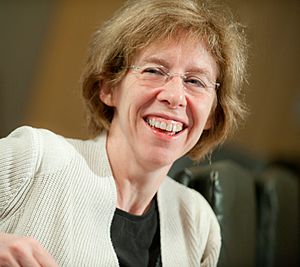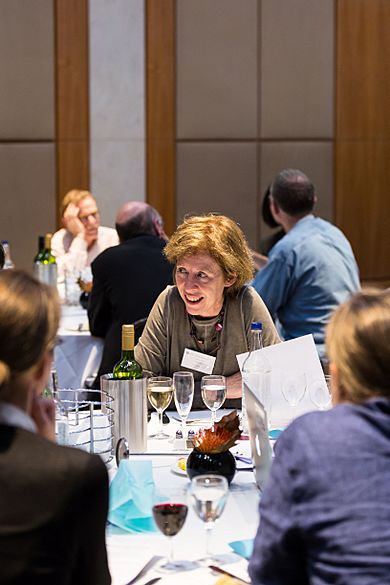Fiona Watt facts for kids
Quick facts for kids
Fiona Watt
FRS FMedSci
|
|
|---|---|
 |
|
| Born | 28 March 1956 |
| Alma mater | |
| Employer |
|
| Spouse(s) | Jim Cuthbert Smith |
| Awards |
|
| Website | www |
Fiona Watt is a British scientist famous for her important work on stem cell biology. Stem cells are special cells that can turn into many different types of cells in the body. In the 1980s, when this field was just starting, Dr. Watt discovered key things about stem cells and their surroundings. Her discoveries helped create the foundation for much of the stem cell research we see today.
Dr. Watt is currently the Director of the European Molecular Biology Organization (EMBO). Before this, she led the Centre for Stem Cells & Regenerative Medicine at King's College London. She was also the executive chair of the Medical Research Council (United Kingdom) (MRC), becoming the first woman to lead the MRC since it began in 1913.
Contents
Early Life and Education
Fiona Watt was born in Edinburgh, Scotland, on March 28, 1956. She knew she wanted to be a scientist from a very young age. Her father was a dental surgeon who also did a lot of research.
She studied Natural Sciences at the University of Cambridge, earning her first degree in 1976 and a master's degree in 1979. She also received her Doctor of Philosophy (PhD) degree from the University of Oxford in 1979. Her PhD research focused on how tiny structures inside cells, called microtubules, organize themselves.
Career in Science
After finishing her PhD, Dr. Watt worked as a postdoctoral researcher at the Massachusetts Institute of Technology (MIT) in the United States for two years. When she returned to the UK, she started her very first laboratory at the Kennedy Institute of Rheumatology in London.
In 1987, she moved to the Cancer Research UK London Research Institute, which is now part of the Francis Crick Institute. There, she led the Keratinocyte Laboratory, studying skin cells. From 2007 to 2012, she worked in Cambridge. During this time, she helped create important research centers like the Cambridge Cancer Research UK Institute and the Cambridge Stem Cell Institute.
Understanding Skin Stem Cells
Dr. Watt's most important research has been about how our skin, especially the outer layer called the epidermis, stays healthy and renews itself. She studied how stem cells in the skin constantly make new skin cells.
She used human skin cells grown in labs and special mice to find different groups of stem cells. Her work showed how certain signals and proteins, like integrin and Notch, control how these stem cells behave. She found the first marker, a type of protein, that could be used to find and separate skin stem cells. This discovery was very important because it helped other scientists find stem cells in many other parts of the body.
Her lab also showed that many different signals, both from inside and outside the cell, help decide what a cell will become. This research helps us understand how stem cells change into specialized cells.
New Discoveries in Cell Behavior
Dr. Watt was a pioneer in using a method called single cell gene expression profiling. This method allows scientists to look at the genes in individual cells. She used it to show that skin stem cells are not all the same. Instead, there are different types of stem cells, each with its own job.
Her research also found different types of cells called fibroblasts in the skin. These discoveries could lead to new ways to treat problems like scarring.
Stem Cells and Health
Dr. Watt's work has also given us new ideas about how problems with skin cells can lead to serious conditions. She found new ways that certain proteins, called integrins, can cause issues. She also discovered a specific change in a protein that can encourage problems. Her findings have been useful for understanding other types of issues as well.
Leadership and Advocacy
Dr. Watt has played a big role in encouraging the UK government to invest in stem cell research. For example, she advised the House of Lords Science and Technology Committee. She has also been the president of important scientific groups, including the British Society for Cell Biology and the International Society for Stem Cell Research (ISSCR).
For 20 years, she was the Editor-in-Chief of the Journal of Cell Science, a major scientific publication. She also helped start eLife, another important journal. Dr. Watt is a strong supporter of women in science. She has written articles and given interviews about the challenges women face in reaching top positions in science.
At the Medical Research Council, she started programs to help doctors do research. She also worked to support the careers of Black and Minority Ethnic PhD students. She helped create new projects focusing on complex health conditions, mental health in teenagers, and pain research. In 2020, Dr. Watt quickly led efforts to fund research into the coronavirus, helping to get money to scientists right when the pandemic was starting.
Awards and Recognition
Fiona Watt has received many awards and honors for her scientific contributions. She became a Member of the European Molecular Biology Organization in 1999. She was also made a Fellow of the Academy of Medical Sciences in 2000 and a Fellow of the Royal Society in 2003. These are very high honors in the scientific community.
In 2008, she was made an Honorary Foreign Member of the American Academy of Arts and Sciences. She also received an honorary doctorate from the Universidad Autonoma de Madrid in 2016. She has been recognized by many other societies, including the Society for Investigative Dermatology and the British Pharmacological Society. In 2019, she became a Foreign Associate of the National Academy of Sciences.
Dr. Watt has won several awards for her research and leadership. These include the American Society for Cell Biology (ASCB) Women in Cell Biology Senior Award in 2008, the first Suffrage Science award in 2011, and the FEBS/EMBO Women in Science Award in 2016. In 2024, she received the ISSCR Achievement Award.
 | Jessica Watkins |
 | Robert Henry Lawrence Jr. |
 | Mae Jemison |
 | Sian Proctor |
 | Guion Bluford |


